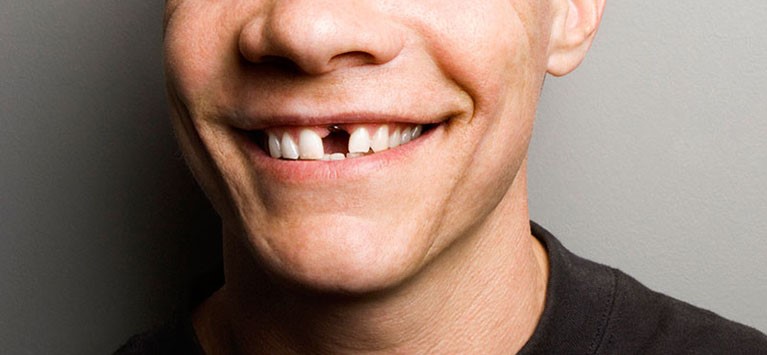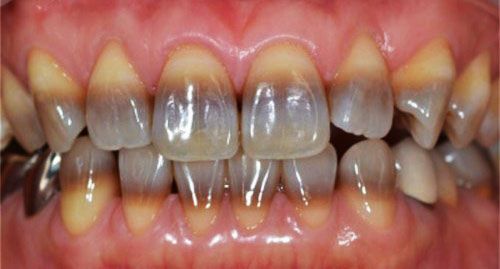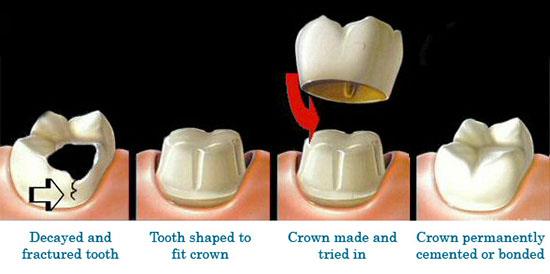B & F Dental Clinic – Patient Information Series
Dental Crowns and Bridges in Singapore
Why Choose
B & F Dental Clinic for your Dental Crowns & Bridges in Singapore?
- Meticulous and experienced dentists whom have worked with many satisfied clients.
- Our clients frequently commend us for being gentle and detailed.
- We take care of your comfort throughout the dental crown / bridge procedure to ensure your satisfaction.
- Fully equipped with x-ray and gum treatment services available if required.
- Subsidies for Pioneer Generation, Merdeka Generation and CHAS available.
- Competitively-priced, value-for money dental crowns & bridges and realistic, highly aesthetic results.
- Contact us today at +65 6909 7664 or WhatsApp +65 9383 6121.
What Are Dental Crowns & Bridges?
Dental Crowns and Bridges are artificial teeth caps made of ceramic and / or metal.
A dental crown covers a single tooth while a dental bridge uses one or more real teeth to support an artificial tooth.

A Royal Crown Covers A Human Head
A dental crown covers a tooth! Dental crowns are sometimes called dental caps.
Dental crowns have to be fixed onto a tooth. When there is no tooth, we will either need a dental implant to support the crown or use the adjacent teeth to affix a dental bridge.


Why Do Dental Crowns?
Why can’t we just do fillings? Fillings are great for filling up holes in teeth. However, they may not work so well for teeth with big holes or when the amount of breakdown is so large that a filling cannot stick stably to the tooth for the long-term.
Furthermore, fillings do not provide additional protection to the teeth they are fixed on as compared to dental crowns.
Teeth that have had root-canal treatment done tend to be more prone to cracking / splitting. For back teeth, we would normally advise you to do a dental crown to reduce the chance of the tooth cracking.

Common Questions
The average adult can generate 15x - 20x the amount of force a 45kg woman wearing Stiletto heels exerts on the floor on their back teeth!
An Ounce of Prevention is Worth a Pound of Cure.
For a tooth, when it finally does fail as we expect it will eventually, it may fail badly. If it fractures deeply, doing a dental crown may no longer be an option. Extraction and replacement may be the next choice.

A Tooth That Has a Crack May Not Necessary Show Warning Signs
In early stages, teeth with minor cracks may not show much sign of problems or only give occasional discomfort.
However, if a weakened tooth is stressed day-in and day-out by chewing forces, the microscopic stresses and cracks build up until it is possible for the tooth to shatter or for a deep crack to appear.

A sudden toothache may happen when you're on a holiday cruise, or in the middle of a big exam, who knows?
When providing crown treatment, we provide a snug-fitting shield for the top of the tooth to protect it when it slams on food, and a tightly hugging belt of material around it to hold the tooth tightly together.
The dental term for this is called “cuspal protection”.
Other Reasons for Doing Dental Crowns
Dental Crowns have aesthetic / cosmetic benefits as well as mechanical benefits.
1. Defective or Discoloured Tooth Enamel
Some people may have discolored or patchy / crumbly teeth enamel from various health / genetic or medical conditions.
Crowns can be used to correct / mask the teeth color when all else fails.

This is an example of tetracycline-antibiotic stained teeth. The person had consumed tetracycline antibiotics during his/her the teeth formation years and it has resulted in discolored teeth enamel. Whitening is usually not effective for such cases.
Other causes of discolored / patchy teeth are: Amelogenesis imperfecta (genetic enamel malformation), Dental Fluorosis, arrested decay (from previous orthodontic treatment) and others.

corrections of Teeth Shape and Size
Crowns allow us to change a tooth’s 3D shape and size.
We sometimes do crowns to close spaces and change teeth shapes, while taking into account the possibility of braces treatment to align the teeth if desired.
At times, we may choose to do Dental Veneers which allow us to close small spaces between teeth without cutting too much of the original tooth.

How is a Dental Crown Made?
Step 1: After assessing that your tooth would benefit from a dental crown, the dentist normally checks for signs of infection. If required, you may be advised to consider root canal treatment to remove any internal infection as necessary.
Step 2: If needed, the center parts of the tooth are built up with suitable materials to form a core. This will form the central support for the crown on the tooth.
Step 3. A small impression may be made of the tooth beforehand. The tooth is trimmed down (under anaesthesia if necessary to avoid discomfort) to a suitable size to accommodate a dental crown.
Step 4: A dental impression or dental scan is taken of the trimmed tooth. Your dentist may record the way your teeth bite together with some impression material which hardens in the mouth. These will be used to make your dental crown.
In some cases, the dentist may temporarily place a piece of soft woven cord string in the gums around the tooth, or do additional procedures, to push the gums away for a better impression / scan. This is usually removed immediately after the impression / scan.
Step 5: If your dental crown is expected to take some time for processing, the dentist may use the original small impression of your tooth to immediately make a tooth-colored temporary crown for you to wear. The temporary crown is temporarily glued onto the tooth with cement that is easier for your dentist to remove.
Step 6: When the crown is ready, the dentist fits the crown onto the tooth and adjusts it to fit the space as needed. If all is well, the crown is permanently cemented onto the tooth. An X-ray may be taken at this stage to check that all looks good.
Common Questions
"How Long Will My Dental Crown Last?"
Dental crowns are commonly said to last up to 15 years on average. However, this is just a figure and does not really mean much.
A well-fitted crown that is well-maintained in a person who does not clench or grind much and has a normal diet may last 30 years or more.
A poorly-fitted crown may trap food and have decay below the edges, resulting in damage to the tooth and loss of the tooth or crown in less than a few years.
Common Questions
Do I have to brush and floss my dental crown since it Will Not Decay?"
While the dental crown material does not decay, the edges of the tooth to which it is sealed can decay. Yes, you still need to brush and floss your teeth well to maintain good oral hygiene.
Dental Crowns / Bridges FAQ
A dental crown is an artificial cap for teeth made from materials such as metal, ceramic or a combination of both.
Dental crowns are used to cover discolored teeth, protect teeth at risk of cracking, replace a missing tooth over a dental implant or change the shape and appearance of teeth.
A dental bridge is a fake tooth attached to real teeth that replaces a missing tooth.
Dental crowns can cost anywhere between $600 – $2000+ in Singapore depending on various factors such as material.
As a estimation, dental bridges are usually counted by the number of teeth they replace. For example, a three-unit dental bridge generally costs the price range of 3 crowns.
On average, two visits are required for a dental crown.
The first visit will be for trimming down the tooth and making a temporary tooth if required.
The second visit will be to fit the permanent crown and cement it on permanently.
With newer technology, it is sometimes possible to get the dental crown on the same day but a waiting time of hours may still apply for processing.
Additional visits may be required if the crown or bridge requires further adjustment.
The dental crown or bridge can be made of silver metal, yellow gold or tooth-colored ceramic materials, depending on your choice and budget.
Doing a crown for a tooth that already has had a root-canal is normally painless as the tooth is already dead. Doing a crown for a living tooth may require some anaesthesia as it can be sensitive. Your dentist will sometimes give anaesthesia if we are working near the gum line.
The usual lifespan estimation for a dental crown is 10 – 15 years on average. However, this is just an estimation, and does not mean much.
A crown that is well-fitted on a person with excellent hygiene can last a lifetime. A crown that is poorly fitted and traps food on a patient with poor hygiene can last months to a year before needing replacement.
Crowns that are failing badly with deep decay may not fall off until the tooth is badly rotted internally. It is best for the dentist to do a regular check for you and x-rays if needed to check for problems.
Teeth that require dental crowns often have suffered some form of damage previously. It is still possible for the existing problems to worsen under the dental crown. Toothache, root canal infection or fracture can still possibly result. However, the chances of such complications for affected teeth properly protected with a well-fitted crown are usually much less than complications than with unprotected teeth. It is best to seek advice from your dentist on your specific problem.
There is normally no down-time. You will be advised to minimize biting and chewing on the temporary crown if needed as the temporary cement may loosen and it may fall off.
If your temporary crown falls off, contact the clinic, bring it back soonest as advised and avoid biting / chewing on the tooth as you do not want to cause any fracture or damage to the exposed tooth. If the tooth is alive, avoid consuming excessively hot or cold foods / beverages as it may be very sensitive.
